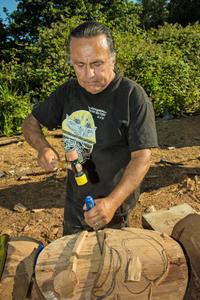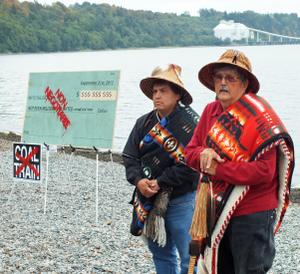
Cultural concerns and treaty rights to protect fish loom large for a shipping terminal near Bellingham.
Floyd McKay, CrossCut

Lummi master carver Jewell James is taking another ceremonial totem pole on a long trip, but this time it won’t be going as a healing pole — like those he carved for the three 9-11 sites — this pole is a political and cultural statement aimed at the export of coal from ports in the Pacific Northwest.
The pole is taking shape only a few miles from the proposed site of the largest coal terminal in the region, at Cherry Point north of Bellingham on Georgia Strait.
It’s a site that James and other Lummis regard as sacred; their ancestors lived, fished and died at Cherry Point through the centuries before white men discovered the area, imposed treaties on the natives and pushed them onto reservations.
The reservations are still there, as are the natives, and pressure continues to bring industry with its economic development, jobs, shipping, railroads, pollution, threats to native fishing areas and trampling of ancient grounds. Over the last two centuries, Cherry Point has seen two oil refineries, an aluminum plant and now plans for yet another giant industry.
Now, the Lummis appear to be well-positioned to play a key, perhaps the most critical role, in determining the fate of a huge proposal to export coal to China from Cherry Point. If the tribe’s objections to the port hold and their treaty rights under federal law withstand any legal questions, the path to approval of the port planned by SSA Marine of Seattle faces a giant obstacle. Company officials, for their part, say they believe the plan can win support from the tribe.
SSA Marine wants to export 48 million tons annually of Powder River Basin coal, and this time the Lummis are deeply dug in. Their line was first drawn a year ago when Lummi elders burned a ceremonial million-dollar check on the beach at Cherry Point and declared no compromise or financial offer would change their opposition to the Gateway Pacific Terminal (GPT).
Lummi speakers were forceful at seven public meetings last year hosted by public agencies charged with reviewing the proposal. Tribal leaders have hosted public events in Whatcom County, where the fate of two key permits will be decided. They even wrote a play, “But What About Those Promises?” to dramatize exploitation of their ancestors.
Up next is the totem pole, which begins its journey about Sept. 19 at the Powder River Basin coalfield in Wyoming and follows by truck the long and winding rail route to Cherry Point. Ceremonies and rallies along the way will reach Seattle and Cherry Point about Sept. 27 to 29.
The Lummis, with regional tribal support, are mounting a two-pronged attack on GPT: the cultural side, headed by James and associates in the Lummi Sovereignty and Treaty Protection Office; and a resource side, relying on key federal court decisions protecting “Usual and Accustomed” fishing rights granted in treaties dating to 1855.

Lummis are quick to say the two items are inseparable because salmon is integral to every aspect of their — and all Salish tribes’ — life. Scholars support that claim and note that Salish tribes have never deviated from their relationship with salmon.
“Prior to and following the arrival of Euro‐Americans, the shorelines of Cherry Point were used as fishing villages and the tidelands and waters of Georgia Strait were used to harvest fin‐ and shellfish for commercial, subsistence, and ceremonial purposes,” Lummi chairman Tim Ballew II said in a 24-page letter to the U.S. Army Corps of Engineers in January. “Although the Lummi Nation still fishes the waters of Georgia Strait, the resources have been degraded by human activities and shoreline development has precluded the use of traditional hunting, fishing, and gathering sites along the shorelines.”
The Corps has jurisdiction over wetlands and piers and it must deal directly with the 5,000-member tribe in a “government to government” manner honoring tribal sovereignty.
